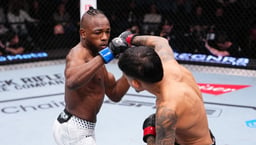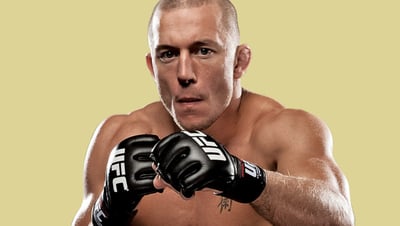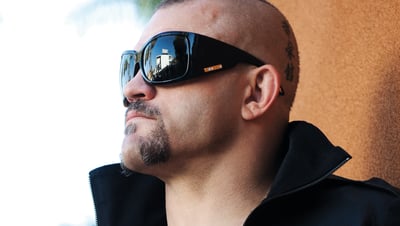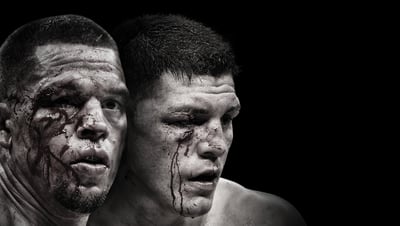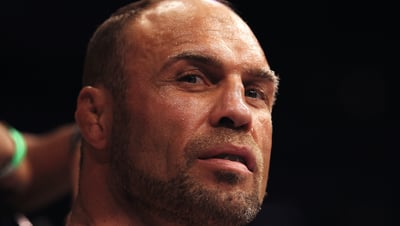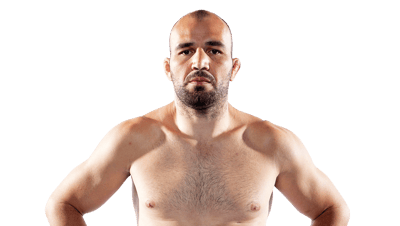We investigate whether the time of day at which you train affects your performance.
There are two types of fighters: those who rejoice at the sound of their alarm clock, explode out of bed and suck in the cool morning air as they sprint to the gym; and those who opt to lay in, limper than the recipient of a Dan Henderson right hand.
The latter may choose to hit the bags later on in the day, but it begs the question – is the early bird less likely to tap out?
A study conducted at the University of Kent, United Kingdom, that discovered people who worked out after a hard day’s graft gave up 15% sooner than people who hit the gym first thing in the morning.
The science may state that he who rises quicker ends the fight faster, but then we got talking to UFC legend Tito Ortiz.
“I train until about 11pm, because I fight at around 9.30pm, so I need my body to be at the peak of its performance at that time,” says the former light heavyweight champion.
“This means that if I wake up at 6am, do my cardio and spar at 12pm, I’ll finish at 5pm or 6pm and then be ready for bed come 9.30pm.
Waking and training later ensures my body is awake and alert when it needs to be.”
So who is right and who is wrong?
Does training early turn you into a titan or will a late workout propel you to MMA glory? Over to the world of sports science…
“Although Tito has a point, which I will talk about later, technically neither is right,” reveals Andrew Murray, senior exercise physiologist at the Sport Scotland Institute of Sport. “According to a number of research papers our bodies peak in mid-to-late afternoon, around 3pm.
This is because at this time our body temperature is a couple of degrees hotter at this time than it is during the morning, making our muscles more supple, lowering the risk of injury and enabling us to perform to a higher level.”
What’s that? You work full-time, so can’t make it to the gym at 3pm? Fear not, training between 2pm and 8pm is still extremely beneficial. And if you can’t make those times, Murray has a solution.
“The reason Ortiz trains late is because it is possible to shift your body’s circadian rhythms,” states the physiologist, who works with Scotland’s elite athletes. “This basically means altering your body clock – think inducing jet lag for a positive purpose – so you can peak at different times, for example a fight set for 2pm, 7.30pm or 11.00pm.”
All of which leaves you with one question: how do you positively induce jet lag when the furthest you travel is to the health store to pick up your monthly supply of protein?
The answer can be found in a 2007 paper published by the Research Institute for Sport and Exercise at Liverpool John Moores University, UK, but, be warned, it’s not for the faint hearted. “Adjustment can be assisted by means of a behavioral strategy that combines the body clock and the homeostatic drive to sleep,” asserted study leader professor Thomas Reilly. “The daily timing of physical training and social events form part of this strategy, as do eating and drinking behavior.”
In other words, if you can’t hit the mat during the day, trick your body into thinking 6pm is 3pm by rising late, eating late and partying until dawn...
Quick liveners
Products that will get your body awake for a fight
AdapTx Labs PreFight
Meet the supplement that lights your fire before a fight or training session. Benefits include: increased energy output; improved reaction time; reduced pain perception and a nice yellow label.
Kip top condition
Just how much sleep does your body need?
Don’t just sit there watching another re-run of Frankie Edgar’s epic UFC 125 bout with Gray Maynard, if you want to be the best get your head down on that pillow and give us 10 uninterrupted hours of kip.
A study conducted over six weeks by Stanford University’s Sleep Disorder Clinic and Research Laboratory found that male basketball players improved their shooting accuracy by 9% and their sprinting speed by 0.7 seconds when they slept for 10 hours rather than the previously recommended eight.
“Optimal sleep is a critical factor in reaching peak performance,” revealed research leader Cheri Mah. Conclusion? If you don’t snooze, you will definitely lose.
POWER NAPS
Does a quick snooze fire you up or leave you sluggish?
As well as training late, Tito Ortiz also swears by a power nap on the day of his fights and it turns out the 'Huntington Beach Bad Boy' is onto something.
Researchers at Allegheny College in Pennsylvania have found that dropping off for between 45 minutes and an hour during the day helps to strengthen your heart and lower your blood pressure, while scientists at Harvard University have discovered that a quick snooze prevents burnout and improves performances. Well, what are you waiting for? Get under your desk and grab some 'Z's.
How to get the perfect sleep
Your six-step plan to successfully entering the land of nod
1: Ditch the smart phone
According to sleep guru Professor Gaby Badre, using technology in bed over-stimulates your mind and switches your focus away from sleep.
2: Switch off the TV
The Better Sleep Council says watching television “erodes the sleeping environment.” Note: that includes SportsCenter.
3: Get into a routine
From cradle to grave, those who sleep best are those who hit the sack at the same time every evening.
4: Don’t drink booze before bed
Put the whisky back in the decanter! Alcohol dehydrates you, and dehydration is a sleep killer that will wake you in the middle of the night.
5: But do drink milk
‘Sleep doctor’ Michael Breus reckons downing a glass of the white stuff will aid sleep as it increases the amount of tryptophan being released into your brain (tryptophan is an amino acid which boosts sleep).
Quick liveners
Oxygen4Energy oxygen
Not only do these cans deliver fast relief from headaches and tiredness, they're also said to boost your immune system, delay the ageing process, boost breathing and improve sporting performance by up to 25%.
Expert views
Find out what some of the world's elite fighters and coaches have to say about training times.
Brad Pickett:
UFC bantamweight
“I’ve never trained late at night. I know a few guys who have, but that’s usually because although they are training in America, they are going to be fighting in Japan, so they want to get their body acclimatized to fighting at a specific and alien time.
That said, I never train too early either. If you go to the gym half asleep, then you will not maintain the quality of workout that you need to do in order to succeed. Because of this, I train twice a day – once at 11am and once at 6pm.”
Dr Ryan Parsons:
Conditioning coach, Team Quest
"The ideal time to train varies between fighters and is dependent on several issues, personal preference being an important one. Often pro practice is scheduled during off-peak hours in many gyms.
Fighters must also consider the work/personal schedules of training partners and coaches. In an ideal world these various factors coincide, but that's often not the case."
Jason 'Shotgun' Young:
UFC lightweight
“I view rest as being the most important thing, so I work my schedule around this. I get up relatively late, train for a couple of hours at 11.30am, have a few hours rest and then train for another two hours at 6pm. This schedule means I am getting rest before, during and after training and I am able to recuperate by getting to bed at a decent time every night. I don’t care what time I fight; once I have made the weight I can fight any time or any where. I just need to switch on and warm up I am ready to go.”
...

